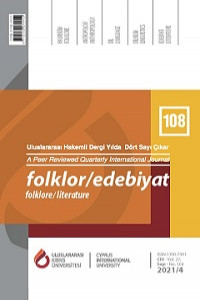Alper Canıgüz’ün Kan ve Gül Romanı Örneğinde Çevirmen ve Dünyası
The Translator and His World in Alper Canıgüz’s Novel Kan ve Gül (Blood and Rose)
Author(s): Nilgin Tanış Polat, Saniye Uysal ÜnalanSubject(s): Novel, Turkish Literature, Translation Studies, Theory of Literature
Published by: Uluslararası Kıbrıs Üniversitesi
Keywords: Alper Canıgüz; translator figure; cultural turn; fictional narrative; cultural studies;
Summary/Abstract: In our age where artificial intelligence products cannot replace human translators with emotional intelligence despite all the technological developments, it is also possible to observe that the importance attributed to the translator as an individual is increasing. The figure of the translator has become a symbol of modern existence in today’s world since it acts as an intermediary between different languages and cultures. The translator finds its response in the world literature in the context of the individual’s self-positioning and rebellion against technological developments with his emotional intelligence. In this context, it can be stated that translator characters in fictional works are increasingly constructed as heroes, however academic works have registered this aspect belatedly. The aim of this study is to examine the novel Kan ve Gül. Bir Kara Dejavu of Alper Canıgüz in terms of the conceptualization of the protagonist who is a translator. The main question for the analysis of this novel is whether this significant change regarding the fictional conceptualization of the translator as a hero has an echo in Turkish literature and a possible new tradition can be traced in this context. Doing this, the results obtained in our qualitative analysis are evaluated descriptively. Discussions about the translator’s position in society, the value s/he receives, and the discussions about the translator’s visibility have gained in importance with the paradigm change that takes place along the axis of the cultural turn. Studies on this topic in Turkey focus on the fictional representation of the translator and his social status, but they do not sufficiently address and trace the consequences of the aforementioned paradigm shift. With this study, the character development of the translator is focused on and the language and structure of the fictional narrative is examined. Furthermore, in terms of the cultural knowledge related to the translator and the profession of translator, it is seen that the character of the translator paves the way for understanding modern human. The novel Kan ve Gül was analysed with reference to approaches of translation studies, literary studies and cultural studies. By this means, this study demonstrated that a new perspective on the translator profession was put forward with the positioning of the translator identity especially in the so-called third space. Thus, an exemplary analysis model for Turkish Literature is presented with the perspective of the cultural turn paradigm that has left its mark on Western literature.
Journal: Folklor/Edebiyat
- Issue Year: 27/2021
- Issue No: 108
- Page Range: 1109-1126
- Page Count: 18
- Language: Turkish

